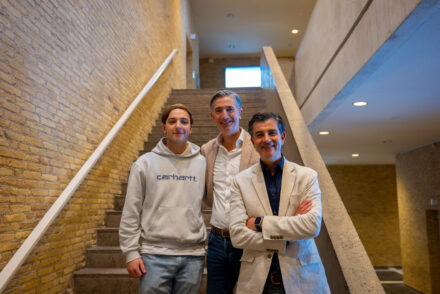‘Online proctoring? Students don’t have a real choice’
More than 5000 students have voiced their concerns about the invasive character of Proctorio. Yet the Executive Board failed to take them seriously and did not adequately respond to their concerns, Tilburg University students write.

By Tilburg University students Lison Hollebeek, Rianne Janssen, Rani Jeans, Kris Marinov and Itaï van de Wal
On April 29, the Executive Board of Tilburg University promised an opt-out arrangement to students who protested the use of remote-proctoring software Proctorio. However, when it updated its Frequently Asked Questions last week, it became quite clear that this was a false promise.
Opting out is a gamble
With exams just around the corner, the Board published a statement saying that students who want to make use of the opt-out arrangement will be referred to the earliest subsequent exam opportunity. This means that a student can forgo the first exam opportunity to take the resit, in the hopes that this will no longer be remote-proctored.
There might be a physical exam on campus for the group of students that uses the opt-out arrangement, but the University acknowledges that it is not yet sure if government measures and practicability will allow this. For international students who are currently abroad, this is not a viable option in the first place, as they may not be able to travel to the Netherlands to take an exam on campus anytime soon. So, the distinct possibility remains that opting out may yet lead to having to take another proctored exam.
Essentially, using the opt-out arrangement is a gamble that may very well force the choice between opting out of an exam altogether, or submitting to remote-proctoring anyway. The former may lead students to fail courses and possibly incur a study delay. In any case, a student opting out forfeits the chance to retake an exam, as opting out means taking the first attempt in the resit period.
These are serious consequences for students, who already experience great pressure to finish their studies without costly delays. At this point, no student in their right mind would choose to opt out. Instead of delivering a reasonable arrangement, Tilburg University has constructed the opt-out arrangement in such a way that students are forced to consent to the terms and conditions of Proctorio.
What’s essential in a crisis
From the beginning, students and staff have been told by their Executive Board that video surveillance of exams would be ‘indispensable’ to retain the value of diplomas. That claim has turned out to be evidently false. The Universities of Groningen and Maastricht have decided not to use any video surveillance. Clearly, these universities are confident that alternatives to remote-proctored examinations are possible and preferable in all cases.
Despite evidence to the contrary, our Executive Board insists that in some cases video surveillance remains essential. This begs the question: Why? Is it in the interest of students? Absolutely not. By signing a petition, writing open letters, and asking questions in representative bodies, more than 5000 students have voiced their concerns about the invasive character of Proctorio. The Executive Board failed to take its students seriously and did not adequately respond to their concerns.
Neither are remote-proctored exams in the interest of staff. Using Proctorio might save work, but is far from conducive for the bond of mutual trust and mutual respect between students and staff that lies at the basis of our education. As long as the Executive Board fails to act in the interests of students and staff, it continues to hollow out trust and good-faith campus politics—the actual essentials in a crisis.
‘Conscientious objections’
On its website, Tilburg University proudly states that its founder, Martinus Cobbenhagen, thought that ‘those who want to understand society should be actively and consciously involved in it’. However, when a petition called on the Executive Board to reject Proctorio, it chose to respond by calling students’ ethical, social and political concerns, ‘conscientious objections’.
By doing so, the Board delegitimized students’ protests as based on purely personal or subjective beliefs, using language normally used to refer to those who refuse mandatory military service. When 5000 students get involved and call for ethical forms of examination, they are not individual ‘conscientious objectors’, and they should not be dismissed as such. Tilburg University would do right by its founder’s vision if it listened to them.
The way forward
With exams fast approaching, it is now realistically too late to call on the Executive Board again to stop the use of Proctorio. But, since the Board itself was rather late in conveying that the opt-out arrangement is not even an opt-out arrangement, it would be fair to say that it is not too late to demand a viable opt-out arrangement in its stead.
But, we cannot stop there. We are in no way out of the woods yet for next semester: the possibility of still having (partly) online examinations is real, and the Executive Board has shown no signs of ruling out the future use of Proctorio. As the crisis drags on, students are increasingly feeling the strain; continuing to subject them to invasive examination methods, despite protests, will have lasting damage.
If Proctorio is still on the table for the upcoming semester, the Executive Board will have failed to comprehend what is essential in a crisis; namely the welfare of students, mutual trust, and the opportunity for students to effectively voice concerns without having them dismissed as ‘conscientious objections’. The way forward for the Executive Board is to make – and keep – the promise to not use Proctorio, and to support its staff in administering examinations in an ethical way instead.
If Tilburg University is serious about helping its students develop into critical and responsible people, who are ‘driven by solidarity and by a sense of responsibility and empathy’, and whose ‘knowledge, skills, and character’ enables them to go forth and better society, it should treat them as such by listening to and acting upon their well founded concerns about the use of Proctorio.







